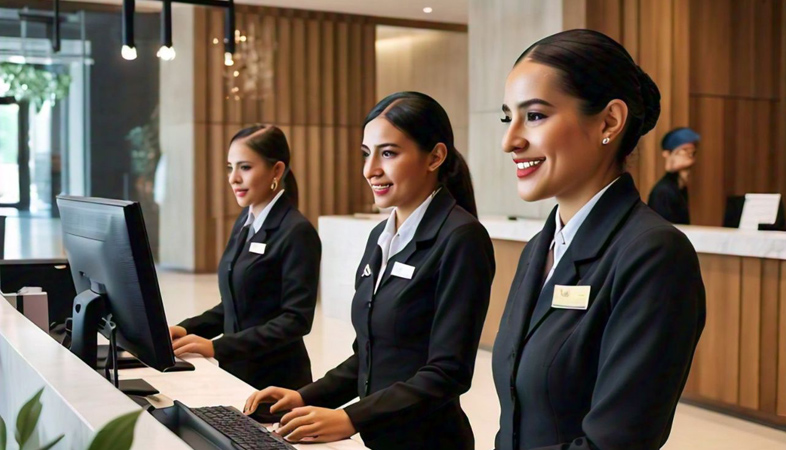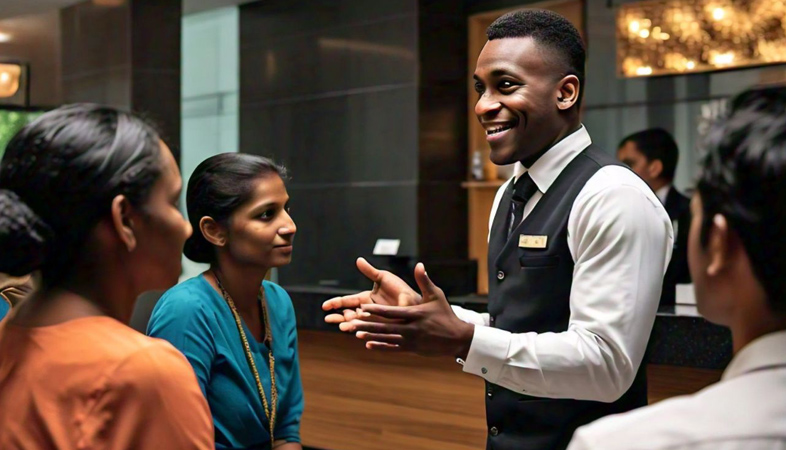The Front Office Blueprint: Crafting a Guest-Centric Service Model
A well-crafted blueprint for the front office can significantly enhance guest satisfaction, streamline operations, and foster loyalty.
The front office is the gateway to a guest's experience in a
hotel, making it imperative to create a service model that is both
guest-centric and efficient. A well-crafted blueprint for the front office can
significantly enhance guest satisfaction, streamline operations, and foster
loyalty. This blueprint should encompass training, technology, personalized
service, effective communication, and continuous improvement.
The cornerstone of a guest-centric front office service model is comprehensive and ongoing training. Front office staff must be well-versed in all aspects of guest service, from handling reservations and check-ins to addressing complaints and special requests. Training should emphasize both technical skills and soft skills, such as empathy, active listening, and problem-solving. Role-playing scenarios can help staff practice their responses to a variety of situations, ensuring they are prepared to handle any challenge with professionalism and grace.
Technology plays a pivotal role in modernizing front office operations and enhancing the guest experience. Implementing advanced property management systems (PMS) can streamline tasks such as room assignments, billing, and check-ins. These systems can also integrate with customer relationship management (CRM) software to track guest preferences and history, allowing for a more personalized service. Mobile check-in options, self-service kiosks, and chatbots for instant guest communication are additional technological advancements that can improve efficiency and convenience.
Personalized service is at the heart of a guest-centric approach. Guests appreciate when their preferences and needs are recognized and accommodated. This can range from remembering a guest's preferred room type or newspaper to acknowledging special occasions like birthdays or anniversaries. Utilizing CRM systems to keep detailed records of guest preferences helps staff deliver tailored experiences. Encouraging staff to anticipate needs and go the extra mile, such as offering a complimentary upgrade or a special amenity, can turn a routine stay into a memorable one.
Effective communication is essential for ensuring smooth operations and maintaining high levels of guest satisfaction. Front office staff should be skilled in clear and concise communication, both with guests and with other hotel departments. Establishing protocols for regular inter-departmental updates can help ensure that everyone is on the same page and that guest requests are fulfilled promptly. Open lines of communication also foster a collaborative environment where staff can share insights and best practices.
Handling guest complaints and issues effectively is another crucial element of a guest-centric service model. Training staff to listen actively, empathize with guests, and offer swift resolutions can turn a potentially negative experience into a positive one. Empowering staff to make decisions and provide solutions on the spot can lead to quicker resolutions and higher guest satisfaction. A structured follow-up process to ensure that issues have been resolved satisfactorily demonstrates a commitment to guest care.
Continuous improvement should be a core principle of the front office service model. Regularly soliciting and analyzing guest feedback through surveys and reviews provides valuable insights into what is working well and where there is room for improvement. Hotel managers should use this feedback to make data-driven decisions and implement changes that enhance the guest experience. Encouraging a culture of innovation and adaptability among staff can lead to ongoing improvements and a more dynamic service environment.
Creating a welcoming and efficient front office environment is also important. The physical layout should be designed to facilitate smooth guest interactions and minimize wait times. Comfortable seating areas, clear signage, and accessible information points can make the front office more user-friendly. Additionally, maintaining a clean and organized workspace reflects the hotel's commitment to quality and attention to detail.
Finally, recognizing and rewarding staff for their contributions to a guest-centric service model can boost morale and motivation. Implementing recognition programs that highlight exceptional service and innovative ideas encourages staff to consistently strive for excellence. A positive work environment where staff feel valued and supported translates into better service for guests.
In conclusion, crafting a guest-centric service model for the front office involves a multifaceted approach that includes comprehensive training, technological integration, personalized service, effective communication, and a commitment to continuous improvement. By focusing on these elements, hotel managers can create a front office that not only meets but exceeds guest expectations, fostering loyalty and ensuring a memorable stay. This blueprint for excellence transforms the front office into the heart of the guest experience, driving satisfaction and success.
.png)






















 at ITC Hotels.jpeg)





